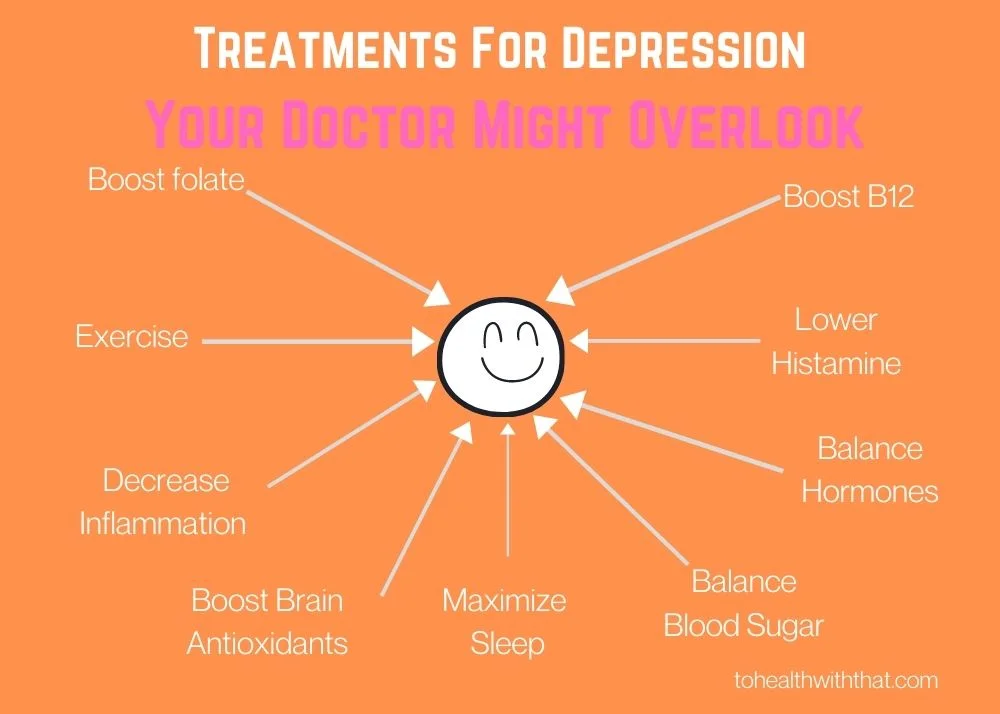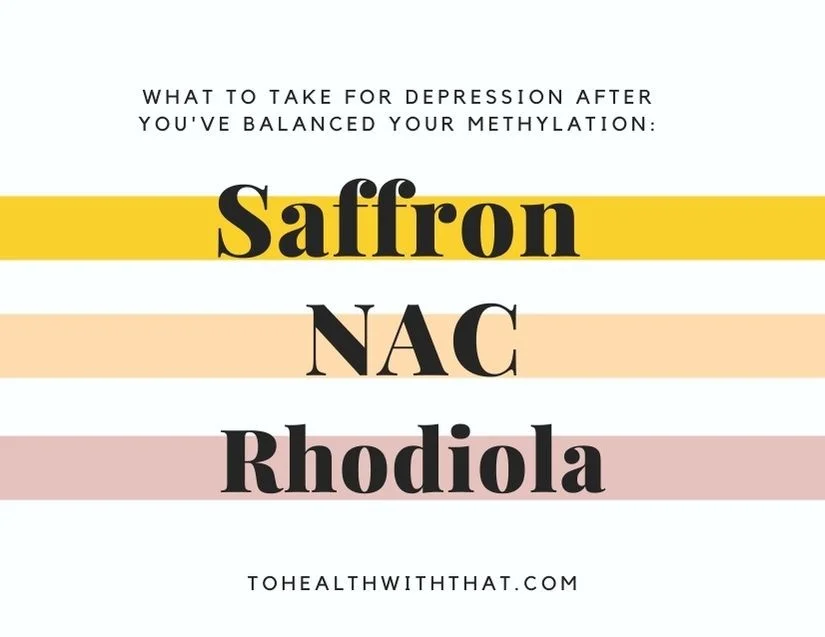MTHFR and depression are intimately linked. We’ve spoken about this before, and if you want to brush up, take a look at Season 1 Episode 8 where we explored the link between the MTHFR mutation and neurotransmitter formation via the BH4 pathway. The quick and dirty version is that when methylation isn’t working optimally, then the pathway that makes many of your major neurotransmitters, including serotonin, melatonin, dopamine, epinephrine, and norepinephrine gets stalled out too.

Season 1 Episode 33 was also all about MTHFR and depression, specifically the entirely fixable causes of depression that your doctor will typically overlook. This whole episode was about steps you can take at home to manage depression. Balancing your methylation is obviously a cornerstone, but there are so many other factors involved that are entirely in your hands.
Another great one to review is Season 1 Episode 34, where we talked about the component of depression that is quite simply a mental bad habit. The part that feels like falling into a rut mentally where your brain travels over the same tracks, the same complaints, the same problems without questioning them or without breaking those patterns. Also, Season 1 Episode 35 in which we talk about some great techniques for breaking those bad habits.
The part of depression we haven’t talked about yet is the supplement part and this is something that people ask me about all the time. At the end of the day, sometimes we really do need a pill to take the edge off while we’re making these other changes. Often, the supplement helps us to have the mental and emotional energy TO make other changes. So let’s talk about a few good options that are typically pretty safe for MTHFR folks and typically well-tolerated.
Some Amazing Depression Supplements We Won’t Be Talking About
There are some great supplements for depression that we won’t talk about today, mostly because we’ve talked about them before at great length. One of the best natural treatments for depression is, of course, balancing methylation using a good folate source or SAMe and a good B12 source. Since those are things we talk about pretty much every week, I’m going to assume you’ve got those covered. For most of my clients, balancing methylation – whether it’s through 5-LMTHF, folinic acid, food sources of natural folate, or SAM-e – is the cornerstone of their depression relief. That doesn’t mean it’s the only thing they need to do, but it’s certainly the foundation.
Another effective supplement for depression that we’ve talked about before is St. John’s Wort. We dove into that one at some length in Season 1 Episode 46 on the link between MTHFR and serotonin. Also, omega-3 fatty acids and fish oils are extremely well studied for depression and we’ve also talked about those at great length because they boost the effectiveness of B vitamins in MTHFR mutation (Season 1, Episode 42). Just remember that if you’re using fish oils for depression you may need a higher dose than the one listed on the bottle.
Saffron For Depression
Saffron is best known as a spice, adding brilliant yellow color and subtle flavor to Middle Eastern food and haute cuisine. Like most other highly-colored spices it’s absolutely packed with antioxidants, carotenoids, and biologically active compounds. In research and clinical practice, saffron shows major benefits for those with depression and it is thought that this could be through some serotonin-boosting mechanism, possibly similar to SSRI medications in which the saffron keeps serotonin in the synapse longer, basically making the same amount of serotonin do twice the work.
In fact, when compared to the actions of SSRI medications, saffron was found to be just as effective for major depressive disorder as these commonly prescribed pharmaceuticals.
Given that this is thought to directly affect serotonin levels, it is best to talk with your doctor before starting saffron if you are already taking an antidepressant medication because there may be an interaction between them.
Saffron is typically dosed around 30 mg per day in research studies.

NAC for Depression
NAC or N-acetyl cysteine is something that we have talked about before as a precursor to glutathione, which is one of your body’s key antioxidants. It is actually precisely because of this function that it is so useful for depression. People with depression are more likely to have higher levels of oxidative stress, inflammation, and inflammatory cytokines like C-reactive protein, tumor necrosis factor-alpha (TNF-a), and interleukin-6 (IL-6). By helping to moderate the inflammation, NAC actually eases symptoms of depression as well.
It is thought that NAC helps to regulate glutamine and dopamine levels in the brain and demonstrates a great ability to both cross the blood-brain barrier and also to increase levels of glutathione within the brain and central nervous system. NAC also shows promise for use with addiction and substance abuse issues.
NAC is actually an amino acid and so it is best taken on an empty stomach. If it is taken with food, then it competes with other amino acids for absorption. The doses typically used for depression are between 2 and 2.4 g/day. This can be divided into two or three doses depending on what is easiest for you to manage.
Rhodiola for Depression
Rhodiola is well known as a supplement for helping to get core energy back in situations of adrenal fatigue or exhaustion. This is because of its action as an adaptogen, and that adaptogenic ability is also thought to be the reason it helps with depression.
Studies have linked hypothalamic-pituitary-adrenal axis dysregulation (or HPA axis dysregulation for less of a mouth full), with depression. HPA axis dysregulation is exactly what is happening in clinical cases of adrenal fatigue or exhaustion. It describes a state of over-reactivity and subsequent burn-out of this vital neuro-endocrine system.
In a study that compared the effectiveness of Rhodiola to the common antidepressant Sertraline, the Rhodiola was shown to be effective, but not quite as effective as the antidepressant, but also far better tolerated with fewer side effects.
The typical dose of Rhodiola for depression is around 340 mg per day. There are other adaptogenic herbs as well, all of which may have similar benefits for depression. These include licorice root, ginseng, American ginseng, schizandra, and ashwagandha.
Thank you so much for listening, and if you’re interested in a 6-weeks to health with MTHFR course, make sure to sign up for the mailing list at tohealthwiththat.com and keep listening to the podcast for more info.
MTHFR is a common genetic mutation that can contribute to anxiety, depression, fatigue, chronic pain, infertility, and more serious conditions like breast implant illness, heart attack, stroke, chronic fatigue syndrome, and some types of cancer. If you know or suspect you have an MTHFR variant, schedule a free 15-minute meet-and-greet appointment with MTHFR expert Dr. Amy today.
Book Your Appointment
